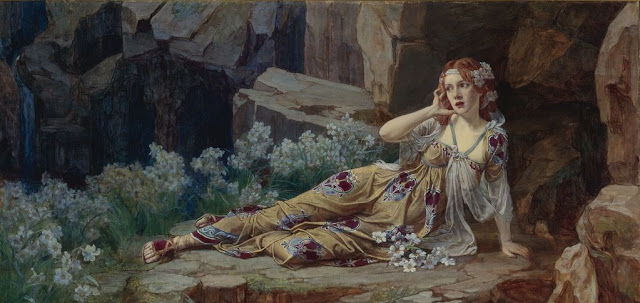ECHO was one of the nymphs with whom Pan fell in love. She was a gay nymph who chattered and prattled all day long and never kept quiet long enough for Pan to win her with music and poetry. One day Hera came down from Olympus to look for Zeus. She suspected that he was playing with the nymphs, but Echo detained her so long with idle chatter that Zeus, who really was there, was able to sneak away. Hera, in a rage, punished Echo by taking from her the gift of forming her own words. From then on poor Echo could only repeat the words of others.
Now at last Pan thought he could win her by his words. But before he had a chance, she had lost her heart to another. He was Narcissus, and he was so handsome that every girl and every nymph he met fell in love with him. Unfortunately, he liked nobody but himself. Echo trailed silently behind Narcissus as he hunted in the woods, hoping to hear an endearing word from him that she could repeat. But he never so much as noticed her. At last toward nightfall, they came to a quiet pool, and as Narcissus was thirsty, he bent down to drink. Suddenly, he stopped and stared, for in the mirroring surface of the water he saw the handsomest face he had ever seen. He smiled and the handsome face smiled back at him. Joyfully he nodded and so did the stranger in the water.
"I love you," said Narcissus to the handsome face.
"I love you," repeated Echo eagerly. She stood behind him, happy to be able to speak to him at last.
But Narcissus neither saw nor heard her; he was spellbound by the
handsome stranger in the water. He did not know that it was his own image that he had fallen in love with and he sat smiling at himself, forgetting to eat, forgetting to drink, until he wasted away and died. Hermes came and led him down to the realm of the dead, but where he had been sitting the lovely Narcissus flower sprang up. Echo stood beside the flower and grieved and pined until she too faded away.
Nothing was left of Echo but her voice, which to this day can be heard senselessly repeating the words of others.
Pan grieved for a while, but then another pretty nymph crossed his path and he forgot all about Echo. Her name was Syrinx.
Now at last Pan thought he could win her by his words. But before he had a chance, she had lost her heart to another. He was Narcissus, and he was so handsome that every girl and every nymph he met fell in love with him. Unfortunately, he liked nobody but himself. Echo trailed silently behind Narcissus as he hunted in the woods, hoping to hear an endearing word from him that she could repeat. But he never so much as noticed her. At last toward nightfall, they came to a quiet pool, and as Narcissus was thirsty, he bent down to drink. Suddenly, he stopped and stared, for in the mirroring surface of the water he saw the handsomest face he had ever seen. He smiled and the handsome face smiled back at him. Joyfully he nodded and so did the stranger in the water.
"I love you," said Narcissus to the handsome face.
"I love you," repeated Echo eagerly. She stood behind him, happy to be able to speak to him at last.
But Narcissus neither saw nor heard her; he was spellbound by the
handsome stranger in the water. He did not know that it was his own image that he had fallen in love with and he sat smiling at himself, forgetting to eat, forgetting to drink, until he wasted away and died. Hermes came and led him down to the realm of the dead, but where he had been sitting the lovely Narcissus flower sprang up. Echo stood beside the flower and grieved and pined until she too faded away.
Nothing was left of Echo but her voice, which to this day can be heard senselessly repeating the words of others.
Pan grieved for a while, but then another pretty nymph crossed his path and he forgot all about Echo. Her name was Syrinx.


Comments
Post a Comment